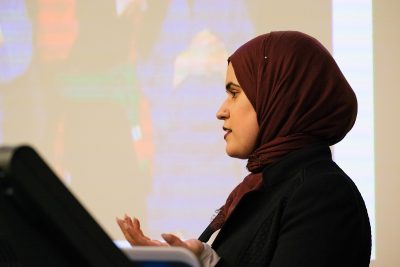
The Islamic Society of Boston University hosted a talk, “Redefining the Muslim Women Narrative” with Laila Alawa Thursday night as a part of the Gender Advocacy and Progress Week.
Alawa, after conducting research at Princeton University, founded The Tempest, a media corporation by and for diverse millennial women. More than 30 people gathered to listen to Alawa detailing her journey as a Muslim-American woman.
Annie Khanani, a junior in the Sargent College of Health and Rehabilitation Sciences, coordinated the event. She said she has been a part of GAP week for a year and a half, and immediately knew that Alawa was needed for this event.
“You go to school here, and you think that you’ll be protected,” Khanani said. “But I walk down the street, and I just don’t feel safe. I’m scared [that] I’ll see something or say something. We are afraid of the unknown.”
Alawa started her speech by asking the crowd how they identified with different topics, from religion to nationality. She then recalled how her life changed after the 9/11 attacks.
“My mother said ‘from this day forward, you are going to be an ambassador of Islam,’” she said
Alawa said she has utilized this perspective to stand up for Muslim women in the public sphere, despite facing major opposition. One of these constraints was societal expectations.
“Muslim women in the media are seen in a very specific lens, I’m just going to say it, a white lens,” Alawa said. “This white savior phenomenon is where Muslim women are perceived as needed to be saved by the west.”
In order to break this, she encouraged women to write down their intentions for their life, and know God has their back, for their intentions are what are judged at the end of the day.
Alawa also discussed the results of the presidential election and offered words of comfort.
“Facing the truth is terrifying,” Alawa said. “When things are about to get good, they get really terrifying first.”
She asked the women and men to recognize that they have the power within them to change their life and their communities, even if they don’t feel it now.
During their discussion, the group talked about developing a “thicker skin” to hateful comments, where the source of hate comes from, and specifically how men can be an ally to Muslim women.
Alawa said men need to focus on not being the “spokesperson” for women, but become a friend by encouraging them to evaluate how they talk about women behind closed doors.
Several attendees said they learned a lot about what it’s like to live as a Muslim-American woman.
Waqar Haider, a sophomore in ENG, said he gained a new insight by attending the talk.
“I came in not knowing, but I got an insight of how it feels to be a Muslim woman and a hijabi,” Haider said. “This helps me get a new perspective, to be a better person and a better Muslim.”
Naureen Syed, a second-year graduate student in the School of Public Health, said she has known of the speaker for some time.
“We found each other on Twitter,” Syed said. “After all, she’s accomplished, [and] she is a great voice for Muslim millennials. She says things that we all are too scared to say.”
Needa Shaikh, a sophomore in ENG, said it’s important for people to address these issues.
“When people say ‘you’re being overdramatic,’ I feel like that is an unsafe mentality,” Shaikh said. “People can’t just live in fear. It’s not healthy. It’s not healthy to not address it and push it to the side.”























































































































